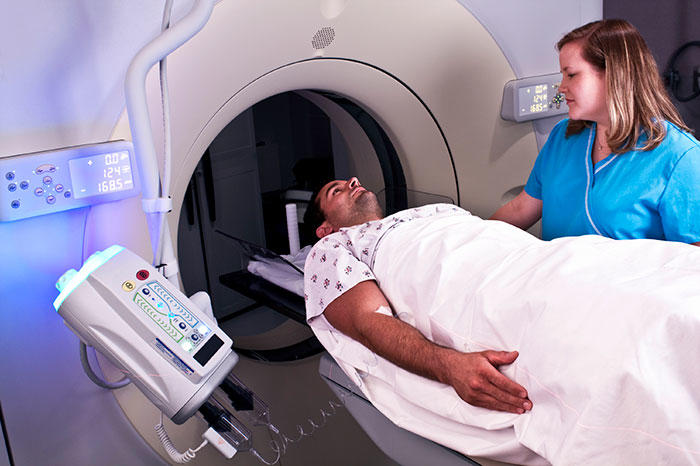The use of diagnostic medical radiation exams has increased dramatically in the U.S. DCEG researchers are assessing cancer risks associated with CT scans, nuclear medicine tests, and fluoroscopically-guided interventional procedures. In addition, they are studying cancer patients treated with radiotherapy to quantify the risk of radiation-induced second cancers.
Diagnostic Radiation Exposures
Pediatric CT Scans and Cancer
A retrospective cohort study to evaluate the relationship between radiation exposure from CT scans conducted during childhood and adolescence and the subsequent development of cancer
Risk Assessment: Computer Tomography (CT) Scans and Screening Examinations
DCEG and colleagues have developed a state-of-the-art risk projection model for radiation-related lung cancer that takes into account the interaction with smoking
Tuberculosis Fluoroscopy
A study of site-specific cancer mortality among tuberculosis (TB) patients exposed to chest fluoroscopy
Radiation Treatment for Benign Diseases
Tonsil Irradiation and Risk of Thyroid and Other Cancers
A study of individuals irradiated during childhood for benign head and neck conditions and monitored for the risk of thyroid and other cancers
Hyperthyroidism I-131 Treatment
A study that examines whether higher doses from I-131 treatment are associated with higher risk of cancer-related death.
Late Effects of Radiotherapy, Chemotherapy, and Other Cancer Treatment
Second Primary Cancers
DCEG investigators are actively engaged in research to address risks associated with treatment-related second cancers, lifestyle, environmental, and medical history factors, and genetic susceptibility
Childhood Cancer Survivor Study (CCSS)
A study of genetic susceptibility to radiotherapy among survivors of childhood cancer
Multiple Primary Cancers Monograph
To identify groups of cancer survivors that are at increased risk for multiple primary cancers, investigators led an effort to provide the first comprehensive population-based analysis of the risk of subsequent cancer in the U.S., resulting in a monograph.
Pediatric Proton and Photon Therapy Comparison Cohort
The Pediatric Proton and Photon Therapy Comparison Cohort, conducted by the Radiation Epidemiology Branch, is a multi-center retrospective cohort to investigate second cancers after photon versus proton radiotherapy.
Second Primary Gastrointestinal (GI) Cancers
A multi-center study of second primary gastrointestinal (GI) cancers among survivors of Hodgkin lymphoma and cancers of the testis, breast, and cervix. This study comprehensively investigates the dose response following fractionated, higher-dose radiation treatment and risk of secondary, non-hematologic malignancies associated with chemotherapy.
